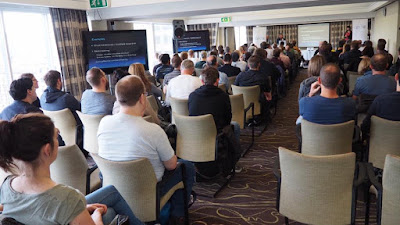Ever since I joined
the Greater Manchester Skeptics Society (GMSS) they’ve been talking about
something called QED. A conference? For £99? I’ve been to conferences before.
They’re often dull, tedious affairs where you get stuck talking to people. Not
anything to get excited about.
As the event drew
nearer, I saw the list guest speakers: Prof Richard Wiseman, Prof Caroline Watt,
Dr Sue Blackmore. Psychologists I have referenced in my dissertation! This looks
interesting. As I got to know my fellow skeptics and they became friends, more
and more were going. Some were even volunteering.
“There’s a free day
you say? Called Skepticamp?” The Friday before the two day event is day where activists
can share their experiences and passions in a series of talks. Following the success
of my EVP talk at the GMSS Soapbox event I volunteered to discuss my research.
So I was going to one of the days at least…
Then I was extremely
fortunate to receive a free ticket for the full conference (Sat and Sun). I am
so glad I did as I would have missed a wonderful, enlightening experience. I heard
some amazing talks and met so many interesting like-minded people. I have many
highlights but here are just some:
- Prof. Caroline
Watt’s talk on Koestler Unit at Edinburgh University (pre-QED talk at GMSS)
- Dr Sue
Blackmore on her out of body experience
- A
paranormal panel with Prof. Caroline Watt, Sue Blackmore, Hayley Stevens and Deborah
Hyde
- Paul
Zenon ‘Secrets of the Psychics’
- The
Quirkology room filled with visual illusions
- Learning
magic tricks with Dave Alnwick
The skeptical
movement has a lot to offer. It has crossover with many disciplines and
unlimited scope. As with any collection people motivated by a unifying force,
it can fall into the trap of being closed to the very groups it is trying to
engage. This point was made at the conference and there were some great
examples of ‘reaching out’ to the wider community, such as The Paranormal
Challenge and Glasgow Skeptics.
My thoughts on the debate between skeptics and believers
is documented on this blog You’ll never change
minds if you only talk to those who agree with you!
I would like to
thank the organisers, speakers and volunteers at QED for a wonderful experience.
I now have post-QED blues and like many others will be counting down the months
until the next one.






